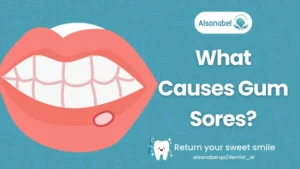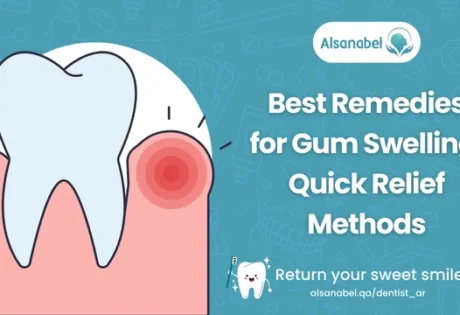
Experiencing a gum sore can be frustrating and painful, making simple activities like eating, drinking, and even speaking uncomfortable. Painful gums can result from various factors, including infections, trauma, nutritional deficiencies, or even stress. Many individuals seek effective solutions for how to treat sore gums to relieve discomfort and speed up healing.
Understanding what causes gum sores is essential for preventing future occurrences and managing symptoms effectively. In this article, we will explore the leading causes of gum sores, the best remedies for gum pain, and practical ways to maintain healthy gums.
What Causes Gum Sores?
There are numerous reasons why gum sores develop, and identifying the root cause can help determine the most effective treatment. Below are some of the most common causes:

1. Poor Oral Hygiene and Plaque Buildup
One of the leading reasons for painful gums is the buildup of plaque and bacteria in the mouth. Inadequate brushing and flossing allow bacteria to thrive, leading to gum irritation, inflammation, and the formation of sores.
2. Canker Sores (Aphthous Ulcers)
Canker sores are small, painful ulcers that appear inside the mouth, including the gums. They are not contagious and usually heal within one to two weeks.
Common triggers of canker sores include:
- Stress and anxiety
- Vitamin deficiencies (B12, iron, folic acid)
- Acidic or spicy foods
- Minor oral injuries (such as biting the gum)
3. Gum Disease (Gingivitis and Periodontitis)
Gum disease is a serious condition that can cause gum sore development. Gingivitis, the early stage of gum disease, leads to redness, swelling, and bleeding. If untreated, it can progress to periodontitis, which can cause gum recession and infection.
4. Infections (Bacterial, Viral, and Fungal)
Are gum sores a sign of an infection?
Yes, certain infections can cause painful gums and sores, including:
- Bacterial infections – Result from plaque buildup and gum disease.
- Viral infections – Herpes simplex virus (HSV) can cause painful gum sores known as cold sores or fever blisters.
- Fungal infections – Oral thrush, caused by Candida yeast, can lead to white patches and sore gums.
5. Trauma and Irritation
Gum sores can also develop due to physical injury. Common causes of gum irritation include:
- Biting or burning the gums
- Brushing too hard or using a hard-bristled toothbrush
- Ill-fitting dentures or braces causing friction against the gums
6. Nutritional Deficiencies
A lack of essential vitamins and minerals, such as vitamin C, vitamin B12, and iron, can contribute to gum pain and slow healing of sores.
7. Stress and Hormonal Changes
Can stress cause gum sores?
Yes, stress weakens the immune system and can trigger conditions like canker sores and gum inflammation. Additionally, hormonal changes during pregnancy, menstruation, or menopause can make gums more sensitive and prone to soreness.
8. Allergic Reactions
Certain toothpaste, mouthwashes, or dental care products may contain harsh ingredients that trigger an allergic reaction, causing irritation and gum sores.
How to Treat Sore Gums: Best Home and Medical Remedies
If you are experiencing a gum sore, several effective treatments can help relieve pain and speed up healing.
1. Salt Water Rinse
A salt water rinse is one of the best remedies for gum pain as it helps reduce inflammation and kill bacteria.
How to use:
- Mix ½ teaspoon of salt in a glass of warm water.
- Swish the solution in your mouth for 30 seconds, then spit it out.
- Repeat twice daily until symptoms improve.
2. Cold Compress for Pain Relief
A cold compress can numb the affected area and reduce swelling.
How to use:
- Wrap an ice pack in a cloth and apply it to the cheek near the sore gum.
- Hold for 10–15 minutes and repeat as needed.
3. Aloe Vera Gel
Aloe vera has natural antibacterial and anti-inflammatory properties that can soothe painful gums and accelerate healing.
How to use:
- Apply fresh aloe vera gel directly to the sore area.
- Leave it for 5–10 minutes, then rinse your mouth with water.
- Repeat twice daily.
4. Hydrogen Peroxide Rinse
Hydrogen peroxide has antibacterial properties that help disinfect the mouth and reduce gum irritation.
How to use:
- Mix equal parts of 3% hydrogen peroxide and water.
- Swish for 30 seconds, then spit it out.
- Use once daily to avoid irritation.
5. Baking Soda Paste
Baking soda neutralizes acidity in the mouth and promotes healing.
How to use:
- Mix 1 teaspoon of baking soda with a few drops of water to form a paste.
- Apply it to the gum sore for a few minutes, then rinse your mouth.
6. Coconut Oil Pulling
Oil pulling with coconut oil helps remove bacteria and reduce inflammation.
How to use:
- Take 1 tablespoon of coconut oil and swish it around your mouth for 15 minutes.
- Spit it out and rinse your mouth with warm water.
7. Over-the-Counter Pain Relievers
If the pain is severe, acetaminophen or ibuprofen can provide temporary relief.
Preventing Gum Sores: Long-Term Oral Health Tips
Preventing gum sores is just as important as treating them. Here are some effective ways to keep your gums healthy and avoid future irritation.
1. Practice Good Oral Hygiene
- Brush twice daily with a soft-bristled toothbrush.
- Floss daily to remove plaque and food particles.
- Use an antibacterial mouthwash to kill bacteria.
2. Avoid Irritating Foods and Drinks
What foods should you avoid if you have gum sores?
- Spicy foods – Can further irritate the gums.
- Citrus fruits and acidic drinks – May cause stinging pain.
- Crunchy snacks – Can scrape or injure the gums.
- Sugary foods and beverages – Feed harmful bacteria and slow healing.
3. Manage Stress
Since stress can cause gum sores, practicing relaxation techniques such as meditation and deep breathing can help prevent flare-ups.
4. Stay Hydrated
Drinking plenty of water prevents dry mouth and helps wash away food debris and bacteria.
5. Eat a Nutrient-Rich Diet
Ensure you get enough:
- Vitamin C (oranges, bell peppers) for gum strength
- Iron (leafy greens, beans) to prevent anemia-related sores
- Vitamin B12 (fish, eggs, dairy) to aid in cell repair
6. Replace Harsh Dental Products
If certain toothpaste or mouthwashes irritate your gums, switch to gentle, alcohol-free options.
Frequently Asked Questions About Gum Sores

What causes gum sores?
Gum sores can be caused by poor oral hygiene, infections, gum disease, trauma, stress, hormonal changes, or vitamin deficiencies.
How do you treat gum sores at home?
The best home treatments include salt water rinses, aloe vera, cold compresses, hydrogen peroxide rinses, and coconut oil pulling.
Are gum sores a sign of an infection?
Yes, gum sores can indicate bacterial, viral, or fungal infections, especially if they persist for long periods.
Can stress cause gum sores?
Yes, stress can weaken the immune system and trigger conditions like canker sores, leading to painful gums.
What foods should you avoid if you have gum sores?
Avoid spicy, acidic, crunchy, and sugary foods, as they can worsen irritation and delay healing.
Dealing with a gum sore can be painful, but with the right treatments, relief is possible. By understanding what causes gum sores and learning how to treat sore gums, individuals can take proactive steps toward healing and prevention. Maintaining good oral hygiene, a balanced diet, and stress management will go a long way in preventing future gum problems. If gum sores persist, consulting a dentist is highly recommended to rule out serious conditions.
%20(2).jpg)

